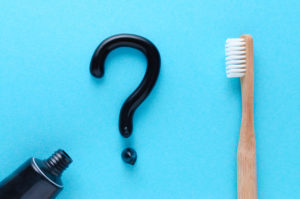
There are trends in every industry, and the oral health industry is no exception. One of the latest trends in oral health is charcoal toothpaste.
Many aspects of charcoal whitening toothpaste might make it enticing, but is it actually safe for your teeth and gums?
Let’s take a closer look at activated charcoal toothpaste benefits and find out more about what you need to know.
What Is Charcoal Toothpaste?
Charcoal toothpaste is toothpaste, or tooth powder, containing activated charcoal. Keep in mind that activated charcoal is different from your standard charcoal, like the charcoal bricks you might use to start your grill.
Activated charcoal is made by burning certain high-carbon materials and then heating them in incredibly high heat—between 1,100 and 1,600 ℉—to activate it. The charcoal is then washed and dried, creating a fine-grained, absorbent product suitable for medical use. If it does have medical uses, are there activated charcoal toothpaste benefits?
Charcoal has been used for centuries around the world to absorb poisons, treat stomach problems, and, yes, remove surface stains and help clean teeth.
Activated charcoal is still used in medical settings to help absorb certain ingested poisons or substances, but other uses should be carefully considered. Recently, charcoal use has become popular in cosmetic products once again—particularly in those that are advertised as “natural.”
Activated charcoal toothpaste products have shown up everywhere, on the shelves, in targeted ads, and all over social media. Most charcoal toothpastes are generally touted as whitening, but there’s more to charcoal toothpaste than meets the eye.
As innocuous as it may seem, even regular toothpaste has the potential to cause problems. Before using this trendy product, learn about charcoal toothpaste health risks.
Charcoal Toothpaste Pros and Cons
Some people claim that charcoal toothpaste is a better alternative to traditional toothpaste, claiming that it can whiten teeth, freshen breath, and remove stains. However, there is limited scientific evidence to support these claims, and the safety and effectiveness of charcoal toothpaste is not well established.
Here are some possible pros and cons of using this toothpaste as part of your dental care routine:
Pros:
- Some people find that charcoal toothpaste is effective at removing surface stains from teeth, making them appear brighter and whiter.
- Charcoal toothpaste may help to freshen breath by absorbing odors and bacteria from the mouth.
Cons:
- There is little scientific evidence to support the effectiveness of charcoal toothpaste. Some studies have found that it is no more effective at whitening teeth or removing stains than traditional toothpaste.
- Charcoal toothpaste may be abrasive and potentially damage the enamel on your teeth. This can make your teeth more sensitive and prone to cavities.
- Charcoal toothpaste may also be difficult to rinse off, which can leave a black residue on your teeth and gums.
- Some people may be allergic to the ingredients in charcoal toothpaste.
It is important to note that charcoal toothpaste is not a replacement for regular oral hygiene practices such as brushing and flossing. It is also important to consult with a dental professional before using any new oral hygiene product to ensure that it is safe and appropriate for you.
What Do Studies Show About Activated Charcoal?
While many companies selling products with activated charcoal make big claims, the benefits of using activated charcoal at home are limited. Apart from the medical use of activated charcoal to treat poisoning, studies show inconsistent results for other treatments.
Though proponents claim activated charcoal can treat anything from indigestion to kidney disease to gas to cholesterol, more research is needed and few home treatments appear to be reliably effective.
There is very little by means of actual studies to provide a bottom line on whether activated charcoal toothpaste works or not. For that reason, scientists are not confident in recommending it.
The History of Charcoal Toothpaste
Considering charcoal toothpaste benefits is not a new concept. There’s evidence of charcoal being used for oral hygiene by early populations, including a record of Hippocrates recommending a charcoal dentifrice powder over 2,500 years ago.
By the 18th century, some Europeans cleaned their mouths with rags rolled in soot or a powder made of burnt bread. However, once a more modern version of toothpaste was made available in the mid-1800s, it smelled, tasted, and looked significantly more appealing.
As such, western cultures moved away from charcoal toothpaste until its recent resurgence. So, if it’s been used for centuries, does charcoal toothpaste work as well as advertisements would have you think?
Activated Charcoal in Dentistry
While there is a long history of charcoal being used for oral hygiene, present-day charcoal toothpaste benefits are often overstated. Oral care technology has advanced significantly so that using charcoal is no longer necessary. In fact, using charcoal toothpaste could have potentially negative effects on your teeth, gums, and dental work.
Oral Health Benefits of Activated Charcoal
There are some charcoal toothpaste benefits to acknowledge. Because activated charcoal is capable of absorption, it can:
- Absorb surface stains on your teeth
- Reduce an acidic pH in your mouth
- Improve bad breath by absorbing excess plaque
However, these benefits aren’t guaranteed and will be temporary. Charcoal toothpaste can’t provide long-term solutions to these problems.
Health Risks of Activated Charcoal
Even if you do experience some charcoal toothpaste benefits, it’s essential to be aware of charcoal toothpaste health risks, too, as they could impact your oral health for life. Here are some of the risks associated with using charcoal toothpaste:
- Irreversible erosion of your tooth structure
- Dental sensitivity
- Gum recession
- Increased risk of cavities
- Gum inflammation and trauma
Some patients also wonder, “Can you use activated charcoal on crowns, veneers, or other dental restorations?” While it’s not explicitly detrimental to dental work and restorations, the abrasiveness of charcoal toothpaste could impact the integrity of the restorations.
Does Charcoal Toothpaste Work?
Perhaps you’ve recently seen an ad for charcoal toothpaste and thought, “Does charcoal toothpaste work?” Is charcoal toothpaste safe for me to use?
The answer to that is complex. Because activated charcoal is both abrasive and porous, charcoal toothpaste products claim they can remove stains to whiten teeth, eliminate plaque, and freshen the breath. Scientifically speaking, there is some data to support these claims. However, there are significant risks to consider as well.
How does charcoal toothpaste work? Let’s start with potentially positive effects on your oral health.
Activated charcoal is negatively charged, so positively charged molecules are attracted to it. Because of this, research indicates that activated charcoal does have the ability to absorb accumulated plaque on the surface of the tooth.
This could also help to temporarily alleviate bad breath. Additionally, activated charcoal can attract the acidic compounds responsible for staining your teeth, aiding in making your teeth look whiter. However, since the charcoal can only absorb stains on the outside of the teeth, the effect is temporary.
Charcoal toothpaste doesn’t impact internal staining. In other words, charcoal toothpaste does not bleach your teeth. Also, because of the abrasiveness that provides the whitening effect, charcoal can cause damage to your teeth.
Is Charcoal Toothpaste Safe?
So then this begs the question: Is charcoal toothpaste safe? Unfortunately, when used repeatedly, charcoal toothpaste can damage both your teeth and your gums. In fact, the American Dental Association (ADA) recently released a review of charcoal toothpaste products and, ultimately, warned against using charcoal toothpaste products.
They also recommended that dentists advise their patients to be cautious about using charcoal toothpastes. There are several reasons for this.
First, charcoal toothpaste is extremely abrasive, which can damage the enamel on your teeth. Enamel is meant to protect your teeth and, when damaged, the dentin is exposed. This leaves your teeth more vulnerable to additional damage and decay.
Over time, the abrasiveness of charcoal toothpaste can cause tooth staining, tooth sensitivity, and gum recession, as well as making you more prone to cavities.
So, charcoal toothpaste can actually do the opposite of what you’re purchasing it for in the first place.
Additionally, the charcoal in the toothpaste can get stuck underneath your gums. This can irritate your gums and cause inflammation or even gum trauma. The charcoal can also seep into any cracks and crevices of teeth, causing staining that’s difficult to remove.
So then, can you use activated charcoal on veneers, crowns, bridges, and fillings? Dentists are also unsure what effect charcoal toothpaste has on the integrity of these dental restorations. Just be aware that it could cause problems or accumulate in and around restorations, creating unsightly black or gray outlines.
Finally, some people wonder, “Will charcoal toothpaste stain braces?” It shouldn’t, but it’s best to wait until your braces are off before using any whitening products.
Alternatives to Natural Whitening
If you want to whiten your teeth, see your dentist! They can tell you which type of whitening products are best for you and tell you how to use products correctly to minimize sensitivity, excess abrasion, and other problems.
Most importantly, practice excellent oral hygiene by flossing and brushing twice daily with a dentist-recommended toothpaste to ensure that your teeth stay as healthy and white as possible.
Choosing The Right Toothpaste
Proper brushing is essential in preventing tooth decay. There are many different types of toothpaste available, and it can be overwhelming to try to choose the right one. Here are some things to consider when selecting a toothpaste:
- Remineralization: Look for a toothpaste that contains fluoride and/or nano-hydroxyapatite, which helps to prevent tooth decay.
- Sensitivity: If you have sensitive teeth or gums, look for a toothpaste that is specifically designed for sensitive teeth.
- Whitening: If you’re looking to whiten your teeth, choose a toothpaste that contains whitening agents.
- Tartar control: If you have a problem with tartar buildup, look for a toothpaste that contains tartar-control agents.
- Flavor: Choose a toothpaste with a natural flavor that you enjoy, as this will make it more pleasant to use.
Charcoal Toothpaste: The Final Word
While activated charcoal may have benefits, it’s important to remember that when it comes to your oral health, charcoal toothpaste has definite risks. It might be fine to use charcoal toothpaste very rarely to address surface stains, but there are better whitening products out there that don’t risk the health of your enamel.
Ultimately, using charcoal toothpaste frequently could damage your teeth and gums.
For that reason, dental experts like Dr. Kami Hoss suggest using toothpastes that provide cleaning benefits without disrupting your mouth’s balanced microbiome. Unnecessarily harsh ingredients, like activated charcoal, can cause more harm than good.
Ensuring your microbiome stays in balance by learning how to take care of your toothbrush, choosing the right oral care products, and answering questions like, “Is mouthwash safe for children” is essential to your oral health.
Your mouth is the gateway to your body, and your oral health is connected to your whole-body health. Keeping your teeth, gums, and mouth healthy is more important than you might think. Kids who don’t brush their teeth or use oral products correctly can experience life-long consequences of poor oral health.
Rather than taking chances with trendy products that make big claims, talk to your dentist about finding a toothpaste that meets your needs.
Dr. Hoss also advises talking to your kids about the danger of social media trends. If you’d like to learn more about how to properly take care of your mouth and what it can mean for your overall health, check out Dr. Hoss’s book, “If Your Mouth Could Talk.”
Sources:
https://www.news-medical.net/health/Charcoal-Toothpaste-Benefits-and-Risks.aspx
https://www.mayoclinic.org/drugs-supplements/charcoal-activated-oral-route/description/drg-20070087
https://www.harpersbazaar.com/beauty/health/advice/a3764/charcoal-toothpaste-pros-cons/
https://www.healthline.com/health/dental-and-oral-health/charcoal-toothpaste#does-it-work
https://www.cnet.com/health/charcoal-toothpaste-why-the-risks-outweigh-the-benefits/
https://scienceline.org/2019/04/the-gray-area-of-charcoal-toothpaste/https://www.medicalnewstoday.com/articles/322609#_noHeaderPrefixedContent
https://www.livescience.com/does-charcoal-toothpaste-whiten-teeth.html
https://theconversation.com/how-did-people-clean-their-teeth-in-the-olden-days-119588
https://www.sciencealert.com/how-effective-are-these-traditional-teeth-cleaning-techniques
http://www.greekmedicine.net/hygiene/Greek_Oral_Hygiene.html
https://www.speareducation.com/spear-review/2012/11/a-brief-history-of-toothpaste
https://jada.ada.org/article/S0002-8177(17)30412-9/fulltext

